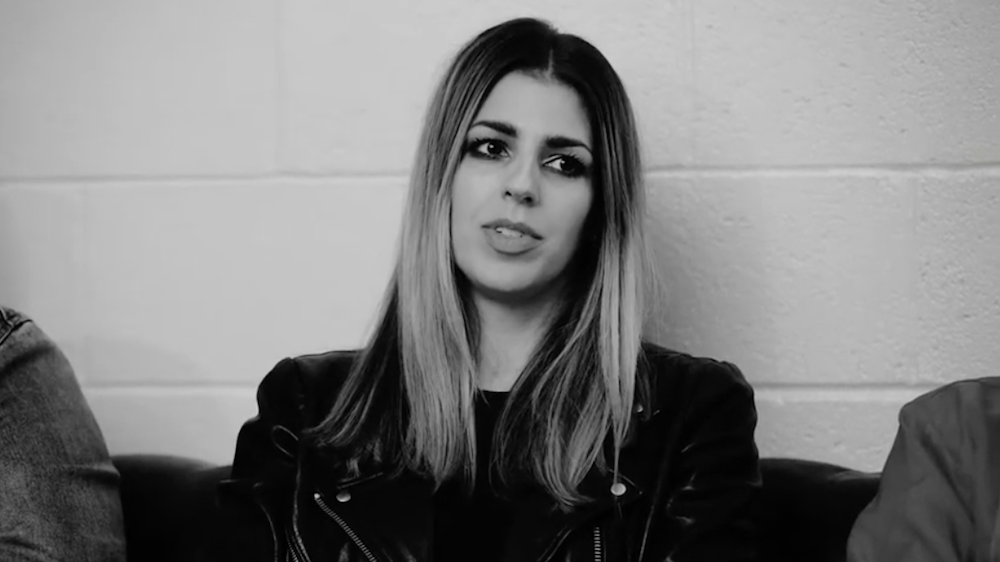Hillsong Worship’s Brooke Ligertwood on Faith, Fellowship, and ‘A Thousand Hallelujahs”

For nearly two decades, Grammy Award winning singer/songwriter Brooke Ligertwood has served the global church through song, leadership and creativity as part of Hillsong Worship.
Concurrently, she has also had a successful mainstream recording career as a solo artist, releasing six previous albums as Brooke Fraser. Now comes a seventh album, but this one is a bit different.
I recently sat down with Brooke to discuss her first live solo album, Seven, releasing this Friday, February 25th. Recorded last spring in Nashville, the project features her husband Scott Ligertwood, Jason Ingram, Pastor Steven Furtick, Brandon Lake, Phil Wickham, and even a 30-piece choir.
In our conversation, the 38-year-old mother of two shares her passion for the marriage of theology and art, as she walks us through a few of the songs including the first single, “A Thousand Hallelujahs”.
Leading off, you’ve spent the better part of two decades as a member of Hillsong Worship. Beyond that, you’ve previously released six solo albums, but this is your first live solo release. Why the decision to release your first live solo album now?
Well, this is the first and, and I keep saying to the team that I like to keep expectations very realistic. This will probably be the first and the last. This is the alpha and the omega . Like you said, I’ve been part of Hillsong Worship for almost 20 years, which is crazy to say. I love being part of it. I love serving my church and the Church. It’s an honor and I love it. And so, I certainly never foresaw that creating an album of songs of worship under my own name would ever happen. It’s never been a desire of my heart or a dream or anything like that.
But a few years ago I wrote a song called “New Wine” that we released through Hillsong Worship. It’s a song of worship about not becoming so attached to the wineskins that we are not willing to allow the Lord to discard or give new wineskins in the appropriate season. So, that song was a real prayer of mine long before I found the courage to bring it to our church team. That is really how I have navigated my life. When I gave my life to Jesus, He gets to do with it what He chooses, whether it makes sense to anybody else or even whether it makes sense to me.
Last year, I really took some time with friends around the country, really to have some fellowship, and then also to try and write. Let’s create and just see what happens.
Songwriting for me is often a slow process and I’m very comfortable with that. So when I took this time last May, it was to my great surprise that the songs flowed. I felt as if they had been labored over for many years, and that came from a place that felt divine. It felt like they were songs that were given, not strived for. Also, when I looked back on the end of that period of time and these songs that had come, I realized that they were chapters of the same book or hues of the same color palette. I realized that this was a collection, at which point I began to ask, well, what does this mean?
I asked myself this because Hillsong Worship is the sound of Hillsong Church. So, those of us that write for Hillsong Worship, we’re part of Hillsong Church. This is where we are serving. But I had written these songs with my friends who aren’t part of our church. What is this? Where does it go? Where do these songs fit? And then as the Lord does, I just kind of began to get things, situations, words, confirmations. This would make it seem that this was something that I was supposed to bring into the world and into the Church at this time.
One of those songs in this new season is called “A Thousand Hallelujahs” which is the first single from Seven. What was the genesis for that song and what is the message you’re trying to convey with it?
“A Thousand Hallelujahs” is a song that has been such a blessing to us personally, before anyone had even heard it. This is because we are friends with Phil Wickham and his wife Mallory. They live just about an hour down the road from us. At my husband Scott’s suggestion, I went down and spent a day with Phil. We were actually just writing in the church that Phil attends with his family. We wrote in this beautiful old church hall. And as we sat in the hall, kind of looking at the windows, the vaulted ceiling and this beautiful church, we began to speak about the generations that had gathered in this church hall and the thousands of hallelujahs that had been offered and brought to the Lord in this space. That’s where that phrase came from and the song kind of flowed forth. And so, (the song is) about the generational nature of Christ’s church and of worship through the ages of the Church.
Just how important is the message of this song in the world we are living in right now?
I think it’s an important one. I think it’s important that with our worship, our worship vocabulary in the Church, that it is ideally reflective of (who God is). I don’t think we need songs that are all high praise. And we certainly shouldn’t have songs that are all focused on our humanity. We need the gamut of a devotional vocabulary in the church when it comes to our worship songs. But certainly I think that in an age where there is so much emphasis on the moment, and on virality that I think that we, as a generation of the church, we do well to remember and reflect on the “capital C” church and not just the church around the world in this moment, but actually the church throughout the ages of human history, over the last 2,000 years. We are part of something that when we reflect on the great cloud of witnesses and we then reflect on how we will be faithful to the Gospel in our generation, we become part of that great cloud of witnesses. And we have set up the next generation with strength to remember who we are as the Church of Jesus.
Jumping to the live recording that became Seven, you recorded this in Nashville. You’ve got an impressive list of people who contributed to the project. Of course your husband Scott was there, but also Jason Ingram, Brandon Lake, Phil Wickham, pastor Steven Furtick, and even a 30 piece choir. How did this grouping of people come together for this project?
Friendship. I guess one of the treasures of the church is fellowship. It’s been so sweet to actually see this group of people kind of come together to bring this to fruition, because many of these people, we’ve been walking with for many years. They are dear to us and have been such an encouragement to us personally. And I just think there’s something special and substantial when songs and worship come out of unity, genuine connection, and relationship. I think that’s what you will hear on this record.
Getting to see the connection of friendship and unity is a really crucial part of what you hear. It’s not a group of slick professionals getting together to try and do something really cool. It’s actually a collection of worshipers in the context of friendship and faith. This album and the recording process was saturated with prayer. We took communion every day. We were very deliberate about this and about this matter. It can’t just be a bunch of good songs. It has to be what it is, which is worship. Worship has to be in the DNA of every single part of this and how it is made.
Of all the songs that you recorded live, is there any one of them that you feel is the cornerstone for the album? And if so, what is it and why?
To be honest, a song that I don’t think will be the most popular song on the album by any means and it might even be one that slips quietly by a lot of people, but the song that’s the cornerstone for me is the very last track, which is called “King Jesus”.
For me, “King Jesus” was always where we were headed from the start of the night. From the first song we were always getting to “King Jesus”. The album was called Seven because of (what we read in) Revelation 1, about the Seven Churches. Jesus standing in the middle of His Church and that vision that Revelation gives us, a lamb in the center, on the throne, that’s where all worship must eventually lead. “King Jesus” is a song that is the entire picture of Jesus reigning victorious. And so for me, that’s where the whole album leads to. And that’s where I think all worship eventually leads.
With that said, what has God been teaching you through the writing and recording process and now the release of Seven? I’m sure there is something that God has shown you.
I will share with a disclaimer, but I see in part and I do not yet see in all. I think in 20 years from now, I’ll be able to speak with perhaps more accuracy, clarity and hopefully wisdom about what God is doing here. I think the biggest lesson is that God knows what is best and He writes the best stories. And if we really trust Him with the authoring and perfecting of our lives, the story is gonna be so much more nuanced and wonderful than we could ever imagine.
I’ve learned that we never graduate from faith this side of eternity. The moment that we get comfortable, as a loving father, it’s His joy as our Father to bring us, to ask us, to call us out upon the water again. For me, saying yes to the Lord on this project is one of the biggest faith steps that I have ever been invited into. And it has come with a cost and a lot of death to self. But that’s the nature of what this is. It’s about us being transformed into Christ’s likeness, because it’s actually not about albums, songs and what other people would perceive as fruit. It’s actually about us in the end becoming more like Jesus and being a faithful witness in our generation, whatever that looks like.
To Purchase Brooke Ligertwood’s Live Solo Release, Seven:
Watch a Video of Brooke Ligertwood’s “A Thousand Hallelujahs” from Seven:




